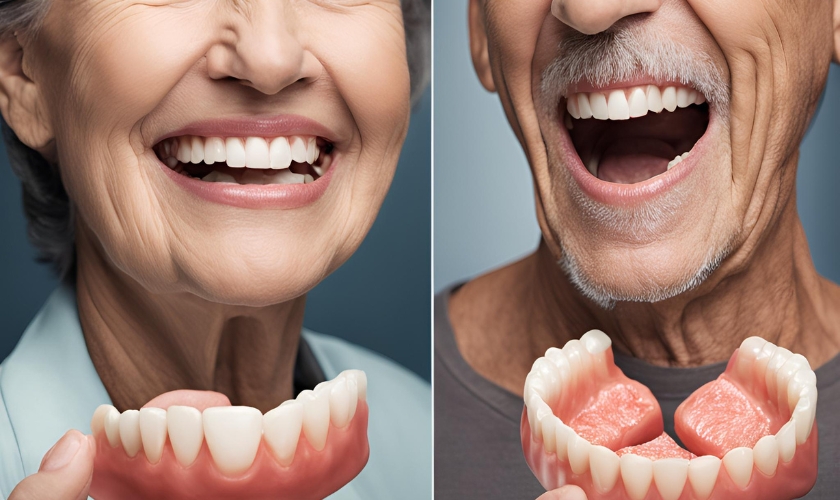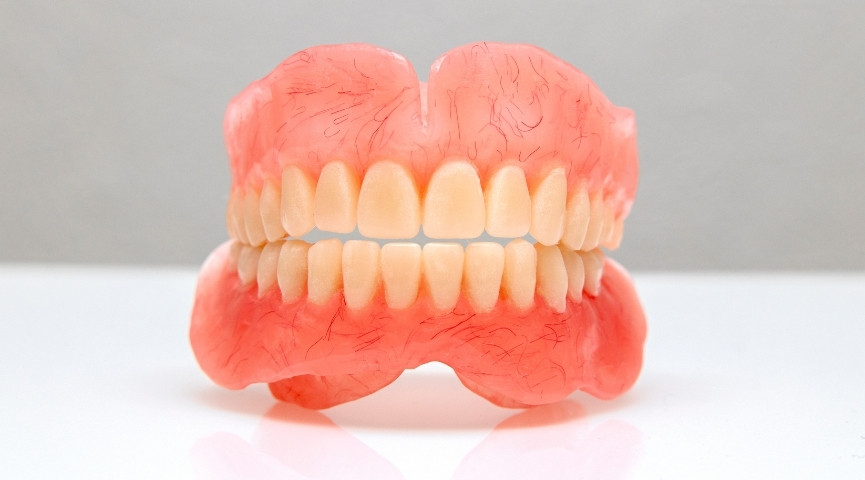
By Thrive Family Dentistry of Auburn | August 14, 2024
Choosing between full and partial dentures can feel overwhelming. Both options offer solutions for missing teeth, but they cater to different needs. Whether you’ve lost several teeth or just a few, understanding the differences between full and partial dentures is essential. This blog will take you through each’s benefits and drawbacks, helping you decide which option best suits your situation.
What Are Full Dentures?
These are designed for people who have lost all their teeth in either the upper or lower jaw. They are removable and typically made from acrylic resin, sometimes combined with metal for added strength. Full dentures sit on the gums and are custom-made to fit your mouth.
Benefits of Full Dentures:
- Complete Replacement: They replace all missing teeth in a single jaw, restoring your ability to eat and speak.
- Improved Appearance: Full dentures can enhance facial structure by providing support to your lips and cheeks.
- Custom Fit: These dentures are tailored to your mouth’s shape, ensuring a snug and comfortable fit.
Drawbacks of Full Dentures:
- Adjustment Period: It may take time to get used to wearing them, as they can feel bulky at first.
- Maintenance: Full dentures require regular cleaning and should be removed overnight.
- Stability Issues: They rely on suction to stay in place, which might not always be sufficient, especially in the lower jaw.
What Are Partial Dentures?
If you still have some healthy teeth, partial dentures are an excellent option. Partial dentures, as opposed to complete dentures, simply replace a small number of lost teeth and are fastened to your natural teeth using precise attachments or metal clasps.
Benefits of Partial Dentures:
- Preservation of Natural Teeth: Partial dentures allow you to keep your remaining teeth while filling the gaps left by missing ones.
- Stability: They are more stable than full dentures since they are anchored to existing teeth.
- Removability: Partial dentures can be easily removed for cleaning, which helps maintain oral hygiene.
Drawbacks of Partial Dentures:
- Possible Discomfort: The metal clasps might cause some discomfort or irritation to the gums.
- Limited Replacement: They only fill in gaps where teeth are missing, so they’re not suitable if you’ve lost all your teeth.
- Adjustment Time: As with full dentures, there may be an adjustment period as you get used to wearing them.
How to Choose Between Full and Partial Dentures?
If you want to know full vs. partial dentures, which would be the right decision for you; this blog can help you out. It’s essential to consider your oral health, the number of missing teeth, and your lifestyle.
1. Assessing Your Oral Health
- Extent of Tooth Loss: Full dentures are suitable if you’ve lost all your teeth in a jaw, while partial dentures are better for those who still have some natural teeth.
- Gum Health: Healthy gums are vital for the success of either type of denture. If you have gum disease, it should be treated before getting dentures.
2. Considering Functionality and Comfort
- Eating and Speaking: Both types of dentures improve your ability to eat and speak. However, partial dentures might feel more stable because they’re anchored to existing teeth.
- Comfort Level: Full dentures might initially feel bulky, while partial dentures could cause irritation from metal clasps. Discuss any discomfort with your dentist to find solutions.
3. Looking at Cost and Maintenance
- Cost: Partial dentures are generally less expensive than full dentures, but costs can vary depending on materials and customization. Full dentures might require more frequent adjustments, which could add to the cost over time.
- Maintenance: Both full and partial dentures require daily cleaning to prevent infections and keep them looking their best. Full dentures also need to be soaked overnight, while partial dentures can usually be stored in a dry container.
How to Care for Your Dentures?
Proper care for both full and partial dentures is vital for maintaining their functionality and longevity. Here are some essential tips for keeping your dentures in top shape:
1. Daily Cleaning
- Brush Dentures: Use a soft-bristle toothbrush and a non-abrasive denture cleaner to gently brush your dentures every day. This helps remove food particles and plaque.
- Rinse After Eating: Rinse your dentures with water following each meal to get rid of any leftover food. This prevents staining and buildup.
2. Overnight Soaking
- Soak in Solution: Overnight soaks in either plain water or a denture cleaning solution are recommended for complete dentures. This keeps them moist and prevents warping.
- Avoid Hot Water: Do not use hot water to soak your dentures, as it can cause them to lose their shape.
3. Handle with Care
- Avoid Dropping: When cleaning or handling your dentures, do so over a soft surface or a basin filled with water to avoid breakage if dropped.
- Check for Damage: Regularly inspect your dentures for any signs of damage or wear. If you notice cracks or loose fittings, contact your dentist for repairs.
4. Maintain Oral Hygiene
- Brush Your Gums: Even if you wear dentures, Brushing your tongue, gums, and roof of your mouth on a daily basis is crucial for maintaining oral health and stimulating circulation.
- Regular Check-Ups: Schedule regular dental visits to make sure your dentures fit properly and to quickly resolve any problems.
5. Avoid Certain Foods
- Be Cautious with Sticky Foods: Foods that are sticky or hard can damage your dentures. Try to avoid such foods or cut them into smaller pieces to prevent any issues.
Choosing between a full denture and a partial denture depends on your individual needs. Full dentures are ideal if you’ve lost all your teeth in a jaw, while partial dentures are better for those with some remaining natural teeth. Both options have their benefits and drawbacks, but with the right choice, you can restore your smile and improve your quality of life. See your dentist to determine which course of action is best for you., considering your oral health, comfort, and budget.
Frequently Asked Questions
If you’ve lost all your teeth in a single jaw (upper or lower), full dentures are likely the best option. However, if you still have some healthy natural teeth remaining, partial dentures would be more suitable. Your dentist will evaluate your oral health and recommend the best option based on your specific needs.
Yes, you can transition from partial dentures to full dentures if you lose additional teeth over time. If your remaining natural teeth become damaged or need extraction, your dentist can create a full denture to replace all the missing teeth.
Caring for full and partial dentures involves daily cleaning to remove food particles and plaque. Use a soft-bristle toothbrush and non-abrasive denture cleaner. Rinse your dentures after eating, soak them overnight in a denture solution, and avoid using hot water, as it can warp the dentures. Regular dental check-ups are also important to ensure a proper fit.


